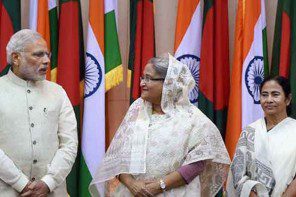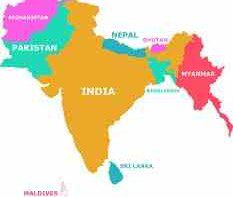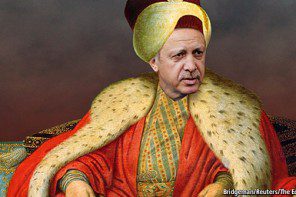Much of the world’s fate is determined by the policies and politics in Europe. Europe, as a continent, houses most of the first world countries in the world. It is particularly Europe that drives the engine of export growth of many countries in the current international financial system. Of course there are a few other powerful states those have considerable stakes in the stability and progress of Europe as a whole. The rise of China, India, Japan, South Korea, Australia, Brazil and South Africa as major economic power-centers are also posing serious challenges to European leadership in the international system of states. With the steady waning of the United States’ unipolarity as the lonely superpower, as described by Huntington in 1999, the present global structure is somewhat unique. As the realist proponents stress that it is power and struggle for power that drive global politics forward, however, the current pattern of international relations is no longer based on Atlanticism. The ushering of so called “Asian Century” is posing significant challenges to the leadership of European and the Western powers’ role in Asia. Exactly this concern has found its expression in the words of Chinese Premier Xi Jinping’s speech at the Conference on Interaction and Confidence-Building Measures in Asia held in Shanghai on 21 May 2014. The Chinese Premier orated “it is for the people of Asia to run the affairs of Asia, solve the problems of Asia, and uphold the security of Asia.” In parallel, the Asian Development Bank (ADB) has recognized the possibility of a promising Asian Century in their report Asia 2050: Realizing the Asian Century. However, there is brewing tension even within the European leading states over the leadership in Europe. In recent times, the manifestation of implicit tension between Britain and Germany caught attention to many keen followers of European politics. Even before the First World War broke out in Europe there was rivalry between Britain and Germany. The rivalry, present for over ten decades, is still very much evident today, just in forms more inherent in contrast to those in the past decades.
This article asserts that Britain is increasingly lagging behind in European leadership competition and Germany is filling that void nicely. The major arguments in favour of rise of German leadership in Europe are discussed in the following sections in little detail. Finally, this article argues that Germany is indeed replacing Britain in the race for European leadership and some recent events indicate that may be there is an Anglo-German rivalry in the making. But the future holds the key as to whether really Britain is falling behind and Germany takes the leading role.
A robust thriving German economy vis-a-vis British economy
The robustness of German economy is evident from its strength. Germany is the second largest exporter in the world after China (US$ 1202 billion), fourth largest national economy, and contributes around 9 percent of total world trade. The economy focuses on advanced industrially produced goods and services, mechanical engineering products, vehicles and chemicals. Unemployment rate is less than half the European average. In the total European Union export German share is 63 percent. In the face of recent financial crises German economy has shown magnificent resilience. BBC has rightly phrased the status of German economy as “thriving economy puts Germany in Europe’s driving seat.” On the other hand the outlook of British economy is gloomy as reported by the Financial Times. Foreign investors are concerned about the political consequences of the 2015 election. Along with the political risks, there are several other risk areas that are limiting Britain’s scope in assuming a respectable leadership position in European politics.
Germany: Potentially the most important ally to the USA
Germany is one of the major allies of USA that contributed troops to Afghanistan in 2001. Germany deployed a contingent of 5350 soldiers and policemen in Afghanistan. Most of its troops were deployed in the north of the country. Kabul, Mazar-e-Sharif, Kunduz and Faizabad were among the major areas where German forces were stationed. Since October 2012 Germany is steadily withdrawing its troops from Afghanistan as other multinational forces are also withdrawing their troops.
The United States and other troop-contributing countries have plans to keep about 12000 troops in Afghanistan for counter-terrorism and local personnel training following the formal withdrawal of International Security Assistance Force (ISAF). Even after the withdrawal has been completed, Germany aims to provide 850 soldiers to a planned training mission to Afghanistan early next year. This plan was part of an understanding between Germany and the USA as a gesture of not abandoning Afghanistan abruptly. This makes Germany one of the biggest troop contributors after the USA in post-withdrawal Afghanistan. Germany also shares the notion with the USA that a hasty withdrawal can heighten dangers. As the German newspaper put it “a badly organized exit would awaken memories of Vietnam and shape the image of the whole 12-year mission: the West’s failure in Afghanistan.” It is steadily being recognized in many intellectual circles that Germany is gradually becoming the most important potential ally to the USA replacing Britain. It is widely believed that the USA is the closest ally and partner of Germany outside the European Union. German support in the areas of countering international terrorism and strengthening transatlantic security community (NATO) is bringing it more closer to the USA. Germany is also a key partner of the USA in providing crisis assistance and conflict management in Afghanistan, Ukraine, the Balkans, and the Middle East. German-US trade is also observing a steady rise.
Germany houses the largest peace-time contingent of American forces outside the USA. German armed forces troops receive training from American armed forces facilities in the USA and both countries regularly organize and participate in joint maneuvers. German armed forces pilots, German air-defence frigate and German submarine unit occasionally exchange cooperation with the USA. In the defence technology transfer sector both countries have robust cooperation. All the areas of cooperation indicate the deepening of German-US relations in the current international order.
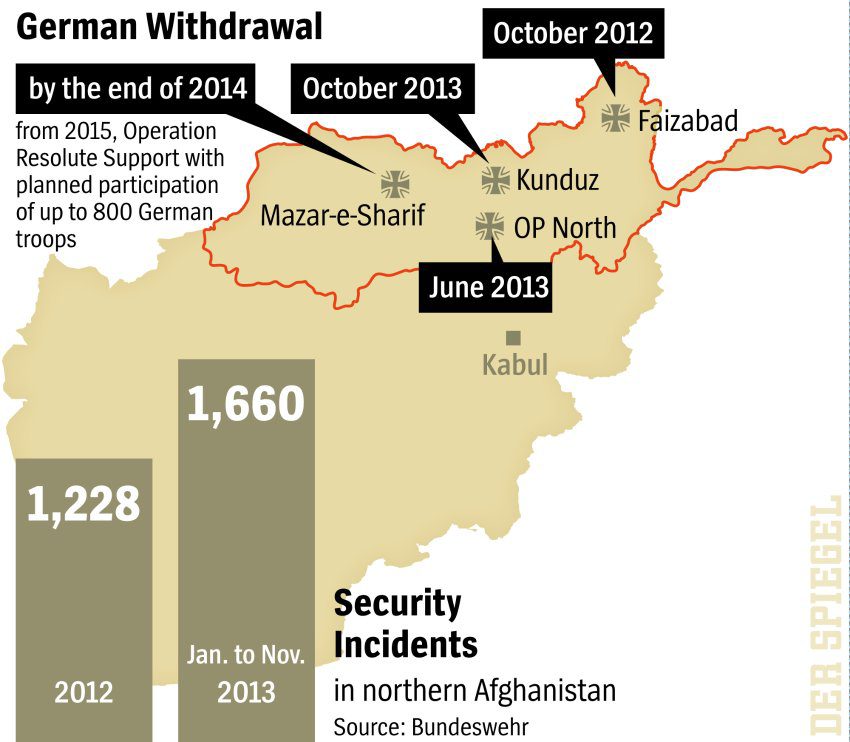
German role in Ukrainian crisis
Germany has been one of the major countries that is working with Russia to settle the Ukrainian crisis as peacefully as possible. Germany is playing the mediating role in offering Russia acceptable options before the West overwhelm Russia with tougher sanctions. Chancellor Markel seems to have opted the strategy of engaging Russia in continual dialogue. One advantage Chancellor Markel has is that she speaks with President Putin in the same language. President Putin speaks good German and at the same time Chancellor Markel can also speak Russian. Nonetheless, Germany has economic stakes in resolving the Ukraine crisis. More than 100,000 Russian speaking people live in Germany and 6000 German companies do business in Russia. Germany has substantial trade surplus with Russia Germany exports about 2.1bn euros (£1.7bn; $3bn) more in goods to Russia than Russia exports to Germany. A quarter of Russian natural gas export goes to Germany. Hence, Russia and Germany both have considerable stakes to behave rationally over the future outcomes of Ukrainian crisis. Stratford, a global geopolitical analysis agency, published a report online stating that Germany is, by all means, playing a crucial mediating role in the Ukrainian crisis. The report entitled Competing Ties Force Germany to Mediate in Ukraine states that “Germany’s goal is to maintain its ties with Russia, avoid more significant EU sanctions on the Russian economy and ensure that a cease-fire is maintained in eastern Ukraine.” The report goes on saying that “while German leaders will continue taking calculated steps to censure the Kremlin, as long as Russian-backed separatists do not significantly expand the territories under their control, Germany will avoid taking concrete measures that would further harm its commercial and political relationship with Russia.” It concludes in saying “the Kremlin is aware of Germany’s ties to Ukraine and of Berlin’s need to maintain good relations with Moscow. These relationships motivate Germany to continue acting as a mediator in efforts to alleviate tensions in eastern Ukraine.” Germany’s increasingly crucial mediating role in resolving Ukrainian crisis bolsters German credibility as a trusting balancer and creating legitimacy as a leader in European affairs.
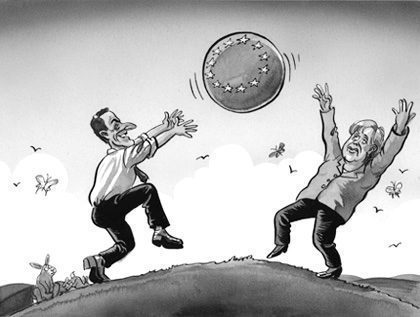
A rivalry in the making?
The foundation of German power rests on the country’s economic strength. Germany is now world’s fourth largest GDP country, next to the United States, China and Japan. Other major European countries, notably Britain and France remain far behind of Germany. As a dominant G8 member economy, Germany wields considerable status, influence and independence in decision-making. German economy is now in better shape than that of Britain. Even Germany dealt comparatively well with the global financial crisis than Britain and has come out of it with relatively better shape than most of the European countries. Germany is relatively geographically better positioned in terms of Britain which contributes to its growing influence. Germany lies at the crossroads of Central Europe and Western Europe. All neighbours of Germany have strong economic, social and political ties. Centrality of Germany also offers it the opportunity to be a mediator in various social, economic and political cross-currents in Europe. A tacit sense of rivalry is comprehendible between Germany and Britain. It was Britain that went directly to military campaign to Libya while Germany carefully refrained from involving in such campaigns. Britain is more eager to project power beyond its immediate region. Although both the nations took part in Afghanistan war in 2001 but Britain sent more troops than Germany.
Historically, unified Germany after the fall of Berlin wall posed greater challenge to British and French supremacy in the post-war European politics. Margaret Thacher was apprehensive about the prospect of a unified Germany’s future. She asserted in 1988 that “Britain does not dream of some cozy, isolated existence on the fringe of the European Community.” Britain is not at all keen to be a part of EU which is predominantly Germany influenced. A few political parties in Britain, especially the United Kingdom Independence Party (UKIP), are very vocal in leaving the EU. At one point of time these parties were at the margins of political discussion but now they are at the mainstream. Even Britain is in favour of putting restrictions on free mobility within Europe, which is one of the core principles of the EU and if imposed can facilitate in bringing down the European Union. Continental Europeans see Britain as a country that use the threat of exiting from the EU as a “bargaining tool” and Britain seeks to secure a “privileged place” in the EU. On the contrary, Berlin expresses its displeasure about Britain’s shifting position and urges Britain to determine what it really wants: either be in or out?
Recently, last November Germany celebrated the 25th anniversary of the fall of Berlin Wall. Statespersons from other European major European countries send their regards to Germany. Britain intentionally avoided sending any such regards, which observers of European affairs are terming as Britain’s implicit rivalry with Germany. The abovementioned discussions indicate that there is an intrinsic rivalry taking shape under the apparently cordial interactions between Britain and Germany. Only time can unveil what is waiting in the future.
[1] Thriving economy puts Germany in Europe’s driving seat, BBC, 17 September 2013. http://www.bbc.com/news/world-europe-24128693
[1] Chris Giles, UK economic outlook remains gloomy, The Financial Times, December 4, 2014. http://www.ft.com/cms/s/0/e10d2ae4-7bb4-11e4-a695-00144feabdc0.html#axzz3L3B0VpuE
[1] Michael Nienaber and Andreas Rinke , Germany pledges support to Afghanistan after combat troops leave, 5 December 2014. http://in.reuters.com/article/2014/12/05/germany-afghanistan-merkel-ghani-idINKCN0JJ1X720141205
[1] Matthias Gebauer, Gordon Repinski and Christoph Schult, The Front Lines: Germany’s Difficult Year in Africa and Afghanistan, Spiegel Online, 21 January 2014. http://www.spiegel.de/international/germany/german-military-faces-a-difficult-year-in-africa-and-afghanistan-a-944553.html
[1] Stephen Evans, Ukraine crisis: Germany’s Russian conundrum, BBC, 5 March 2014. http://www.bbc.com/news/world-europe-26440560
[1] “Competing Ties Force Germany to Mediate in Ukraine”, STRATFOR, November 19, 2014
The writer is a Research Associate at BEI and member of Editorial Team, FAIR

